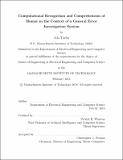Computational recognition and comprehension of humor in the context of a general error investigation system
Author(s)
Taylor, Ada (Ada V.)
DownloadFull printable version (2.764Mb)
Other Contributors
Massachusetts Institute of Technology. Department of Electrical Engineering and Computer Science.
Advisor
Patrick H. Winston.
Terms of use
Metadata
Show full item recordAbstract
Humor is a creative, ubiquitous, and powerful communication strategy, yet it is currently challenging for computers to correctly identify instances of humor, let alone understand it. In this thesis I develop a computational model of humor based on error identification and resolution, as well as methods for understanding the mental trajectory required for successful humor appreciation. An infrastructure for constructing humor detectors based on this theory is implemented in the context of a general error handling and investigation system for the Genesis story-understanding system. The computational model consists of a series of Experts that quantify important story elements such as allyship, harm to characters, character traits, karma, morbidity, contradiction, and unexpected events. Due to the homogeneous structure of their interactions, Experts using different methodologies such as simulation, Bayesian reasoning, neural nets, or symbolic reasoning can all interact, share findings of interest, and suggest reasons for each other's issues through this system. This system of Experts can identify the resolvable narrative laws that drive humor, therefore they are also able to discover unintentional problems within narratives. I have additionally demonstrated successful quantification of indicators of effective human engagement with narrative such as suspense, attention span length, attention density, and moments of insight. Variations in Expert parameters account for different senses of humor in individuals. This new scope of understanding allows Genesis to help authors search their narratives to determine if higher level narrative mechanics are well executed or not, a crucial role usually reserved for a human editor. By successfully demonstrating a framework for computational recognition and comprehension of humor, I have begun to show that computers are capable of sharing an ability previously considered an exclusively human quality.
Description
Thesis: M. Eng., Massachusetts Institute of Technology, Department of Electrical Engineering and Computer Science, 2018. This electronic version was submitted by the student author. The certified thesis is available in the Institute Archives and Special Collections. Cataloged from student-submitted PDF version of thesis. Includes bibliographical references (pages 109-110).
Date issued
2018Department
Massachusetts Institute of Technology. Department of Electrical Engineering and Computer SciencePublisher
Massachusetts Institute of Technology
Keywords
Electrical Engineering and Computer Science.